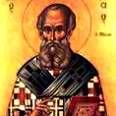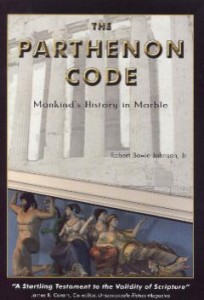by St. Athenagoras of Athens
 A Plea For Chrisitans was written by Athenagoras (c. 176 A.D.) to the Emperors Marcus Aurelius and his son Commodus as a philosophical appeal for justice on behalf of the Christians. In this work, Athenagoras endeavors to show the emperors that the ill-treatment of the Christians is entirely unreasonable. This is the first philosophical demonstration of the unity of God in Christian literature. He also sets forth the doctrine of the Trinity.
A Plea For Chrisitans was written by Athenagoras (c. 176 A.D.) to the Emperors Marcus Aurelius and his son Commodus as a philosophical appeal for justice on behalf of the Christians. In this work, Athenagoras endeavors to show the emperors that the ill-treatment of the Christians is entirely unreasonable. This is the first philosophical demonstration of the unity of God in Christian literature. He also sets forth the doctrine of the Trinity.
 The reason for excerpting these chapters is the remarkable claim, and proofs, which are very similar to Robert Bowie Johnson’s thesis in The Parthenon Code: Mankind’s History in Marble. Johnson’s reasoning and conclusions are compelling, and I find that Athenagoras has already laid the clear groundwork for the very same idea: The pagan gods are simply the deified men and women of the past. Johnson goes further, stating that they are, in fact, the Biblical characters of Genesis, but from the point of view of those who reject God and His Laws, and would make themselves “like God.” I don’t get anything for recommending The Parthenon Code, but I do suggest you read it.
The reason for excerpting these chapters is the remarkable claim, and proofs, which are very similar to Robert Bowie Johnson’s thesis in The Parthenon Code: Mankind’s History in Marble. Johnson’s reasoning and conclusions are compelling, and I find that Athenagoras has already laid the clear groundwork for the very same idea: The pagan gods are simply the deified men and women of the past. Johnson goes further, stating that they are, in fact, the Biblical characters of Genesis, but from the point of view of those who reject God and His Laws, and would make themselves “like God.” I don’t get anything for recommending The Parthenon Code, but I do suggest you read it.
PROOF OF THE SAME FROM THE POETS
But among the Greeks, also, those who are eminent in poetry and history say the same thing. Thus of Heracles:—
“That lawless wretch, that man of brutal strength,
Deaf to Heaven’s voice, the social rite transgressed.”
Such being his nature, deservedly did he go mad, and deservedly did he light the funeral pile and burn himself to death. Of Asklepius, Hesiod says:—
“The mighty father both of gods and men
Was filled with wrath, and from Olympus’ top
With flaming thunderbolt cast down and slew
Latona’s well-lov’d son—such was his ire.”
And Pindar:—
“But even wisdom is ensnared by gain.
The brilliant bribe of gold seen in the hand
Ev’n him perverted: therefore Kronos’ son
With both hands quickly stopp’d his vital breath,
And by a bolt of fire ensured his doom.”
Either, therefore, they were gods and did not hanker after gold—
“O gold, the fairest prize to mortal men,
Which neither mother equals in delight,
Nor children dear”—
for the Deity is in want of naught, and is superior to carnal desire, nor did they die; or, having been born men, they were wicked by reason of ignorance, and overcome by love of money. What more need I say, or refer to Castor, or Pollux, or Amphiaraus, who, having been born, so to speak, only the other day, men of men, are looked upon as gods, when they imagine even Ino after her madness and its consequent sufferings to have become a goddess?
“Sea-rovers will her name Leucothea.”
And her son:—
“August Palaemon, sailors will invoke.”
